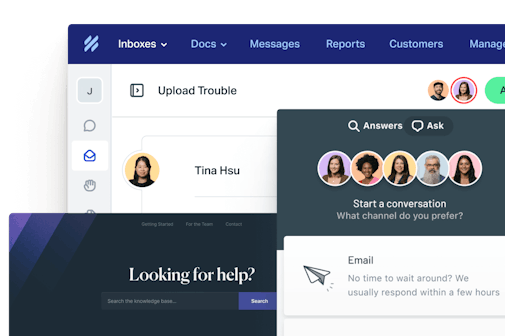You likely never wanted to be a SaaS (software as a service) support pro when you were growing up — in fact, such a job may not yet have existed. Now though, you've heard what a rewarding career it can really be. SaaS support professionals can flex a wide range of skills, and they have the opportunity to have a real business impact.
If you do make the leap, you'll quickly find out just how great it feels to delight a customer, and you’ll want more of that feeling. There's no customer support major in college, though, so how do you prepare to switch careers and become a support pro?
The support team at Help Scout has a few tips to share, along with stories about our own career changes.
1. Start keeping track of your career capital now
Career capital is the unique collection of hard and soft skills, accomplishments, and connections you have earned throughout your working life.
No matter what your career is, you’re already creating value in your current role, so you should be recording that value. For example, "Over a 6 month period, I increased sales 7% by making thoughtful suggestions to customers when they were ordering" has a lot more impact than "Worked at a local sandwich shop."
When it comes time to market yourself for a support role, you'll be able to share specific stories and concrete numbers to paint a vivid picture of the kind of employee you are and the value you can create for a company.
I was working in retail, putting myself through university. I joined an online community on a video game website that publishes news, reviews, videos, etc. One day there was an influx of new people in the community, and I felt the need to make them feel welcome and at home. I did such a good job that one of the editors-in-chief of the website offered me a job moderating their boards.

Shaun McIlroy
I absolutely used stories from my experience as a front-desk attendant, babysitter, concession stand worker, and restaurant hostess for support interview questions. The self-control it requires to handle a tough customer interaction face-to-face in real time is something to be proud of; it's not easy!

Kelly Hummell
2. Connect with the customer support community
It can feel daunting to make the career switch to customer support if you don't already know someone who has done it. Thanks to the internet, it's easier than ever to surround yourself with people talking about this line of work.
You can learn from people you've never even met by joining customer support communities like Support Driven and CX Accelerator and participating in meaningful conversations on Twitter.
I graduated with a degree in marketing. I was doing account management for a small web design agency and eventually did support for their sister social media startup. I was a team of one during my time there and was eager to learn all of the things. Support Driven and the Help Scout blog really helped me learn so much about SaaS customer support and how to hone my craft.

Elyse Roach
3. Conduct an informational interview
Once you've joined a customer support community, start listening, contributing where you can, and connecting honestly with people.
Rather than reaching out to the top customer support blogger in the world, look for someone in an earlier career stage who might have a few minutes to chat. Explain why you want to make the career switch to customer support, and ask if they might be willing to share a little more about their story.
You might offer to buy a coffee for a local support pro you found on LinkedIn, or suggest a short video call with someone you met in a CS community. Support Driven even has a mentor program for this purpose.
Prepare questions ahead of time about how their career developed, what they do and do not enjoy about their work, what they wish they knew when they were first starting out, and what skills you should be working on.
Just be sure to keep it concise and be respectful of their time. You'll gain valuable insight into the industry and grow your network at the same time.
I landed in support after five mostly happy years in the food industry. I posted on a Facebook group for job seekers in my city about wanting to move into support for software companies, because I felt it would be a natural transition of my skills. I received a very kind and encouraging message from a long-term support member at a company that was hiring. We met for coffee and hit it off swimmingly, and she gave me helpful tips for the job application.

Paola Maciel
4. Celebrate your transferable skills
If you've trained for a very specific career path, you may feel pigeonholed and unable to do anything else. The truth is that you've got more transferable skills than you realize.
Make a table with two columns: Skills and Examples. Fill in the first column with the skills needed to excel in your current profession as well as the skills you'll need for customer support. Then write out specific examples of how you apply all of those skills in your work.
For instance, pharmacists have communication and teaching skills that would be valuable in customer support: They break down very complex information into understandable, bite-sized pieces to ensure patients follow their prescriptions safely. Check out this template to get started!
I was in my last year of school getting an anthropology degree. A local startup needed people on their support team who could write and knew basic HTML and CSS, and I'd spent approximately all of ages 9-12 on Neopets, so I knew that.

Emily Chapman
Working as a barista, I learned how to keep cool under pressure, how to still be helpful and kind while busy, and how to respond to crisis situations, like when a fellow employee tripped and accidentally threw the entire fresh-from-the-pot-scalding-hot coffee right at the customer. Take responsibility, do what you can to make things better, and apologize sincerely.

Melanie Shears
I was a community manager in the music business world. When I realized I needed to pivot into a more sustainable business field, taking care of people in a technical capacity felt very similar to community organizing in the early days of digital spaces.

Alison Groves
5. Identify what you need to know and start learning it
Once you've made your list of transferable skills, you'll be able to identify what you're missing. What new skills will you need to develop in order to work in SaaS customer support? Then dive into blog posts, YouTube videos, and online courses to start learning. Here are a few of our favorite sites for free and paid online courses:
If your situation affords you the time, you might even spin up a side hustle that exposes you to challenges you wouldn't have the opportunity to tackle in your regular 9-5. It doesn't matter if you make any money doing it, but it's a great way to build more career capital and show you've got initiative.
I taught elementary school for three years. When I interviewed for my first support role, the founders told me I was the applicant with the fewest technical skills, but they liked my people skills. I asked them which of those would be harder for them to teach a new hire. That night, I signed up for a beginner JavaScript class on Codecademy to prove I could grow my technical knowledge, and I got the job.

Kristi Thompson
I was a junior graphic designer at a small email marketing firm. I had some previous technical skills but had to refine my writing skills. I learned about active listening and how to refine my language and tone to be helpful, without being condescending, and to be empathetic without being overly apologetic.

Disha Mungra
6. Make your skills visible
Now you're ready to show the world just how capable you are. Look for shareable ways to prove what you can do, ideally online. You don’t want hiring managers to be guessing whether or not you would be a risky hire.
By skimming your personal website, Twitter, forum contributions, or other online material, they should get a strong sense of your personality and knowledge set. Make it easy for them to imagine you thriving on their support team.
Tinkering with some basic HTML and CSS to build or customize your site is a great way to signal you're tech savvy and willing to learn new things. Blogging shows you've got the written communication skills needed to thrive in customer support, particularly in a remote role.
Write on your own site, and even try guest posting on someone else's. Not sure what to write about? Share about your side hustle, list the troubleshooting steps you took to solve a problem, write down the advice your friends always come to you for, or explain a project you created while working through an online tutorial.
I was a full-time secretary in student services at a university. My wife was working as the creative director at a local startup that ran a form app and a support position opened up. I applied, interviewed, and got rejected. Then I wrote a blog post for Zapier to try to get some experience in the SaaS world, applied again for a new opening at the startup, and that's when I started working in support!

Justin Wolfe
7. Find the right person and write them a great email
Once you've crafted the perfect customer service resumé and applied for your dream job, find someone who will be involved in the hiring process and reach out to them personally.
This does not mean sending an email that starts with"Dear sir/madam, my CV is attached." Show them you've really taken the time to get to know the team you're hoping to join. They'll have a lot of applications and resumés to review, so make their job easy.
Briefly share how you'll hit the ground running and create value for them, not how their company will benefit you. This is your chance to really set yourself apart!
When I applied for my first support role, I wrote a poem based on T.S. Eliot's 'The Love Song Of J. Alfred Prufrock', called 'The Love Song of Paola Wants Out Of The Food Industry,' about my time working at a burrito shop. Play to your strengths!

Paola Maciel
Jumpstarting your SaaS customer support career
Before you know it, you'll have your first customer support interview and you'll be able to share more about how the career capital you've built in your prior jobs will uniquely serve you as a SaaS support pro. Each and every work experience you've had is a stepping stone to your next career.
There is a huge range of industries that provide customer support, and they serve an even more diverse collection of customers. We need customer support pros like you to join the field from all different backgrounds, to bring unique skill-sets and perspectives to the table and care for every customer with empathy and integrity.







